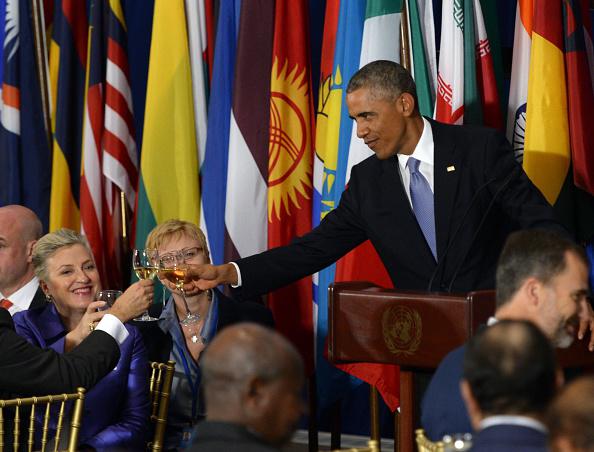The political event of the day was Barack Obama’s speech to the United Nations General Assembly. Like many of his speeches, it earned trust by addressing issues that less forthright leaders might ignore or spin around—in today’s case, by bringing up the subject of Ferguson. It pivoted into an optimistic, history-supported case for the power of institutions and cooperation. But what was meant to be a pep talk came across more as a wistful reminder of the old days when things worked.
On the international front, Obama discussed ebola, Russia’s proxy war in Ukraine, and ISIS, speaking about the way that each situation represented a failing of international cooperation. (His words on Russia were especially pointed, explicitly comparing recent events to the kind of territorial greed that triggered both world wars.) He talked about the U.N.’s creation after World War II, and the theory of international justice he eventually articulated seemed nostalgic for that era—in which high-minded norms of international law were backed by the stick of righteous coalition force and the carrot of Marshall Plan-style aid:
… we will take action against threats to our security—and our allies—while building an architecture of counter-terrorism cooperation. We will increase efforts to lift up those who counter extremist ideology, and seek to resolve sectarian conflict. And we will expand our programs to support entrepreneurship, civil society, education and youth—because, ultimately, these investments are the best antidote to violence …
This is what America is prepared to do—taking action against immediate threats, while pursuing a world in which the need for such action is diminished. The United States will never shy away from defending our interests, but nor will we shrink from the promise of this institution and its Universal Declaration of Human Rights—the notion that peace is not merely the absence of war, but the presence of a better life.
His remarks on Ferguson, meanwhile, laid out the American liberal’s case for patriotism:
But we welcome the scrutiny of the world—because what you see in America is a country that has steadily worked to address our problems and make our union more perfect. America is not the same as it was 100 years ago, 50 years ago, or even a decade ago. Because we fight for our ideals, and are willing to criticize ourselves when we fall short. Because we hold our leaders accountable, and insist on a free press and independent judiciary. Because we address our differences in the open space of democracy—with respect for the rule of law; with a place for people of every race and religion; and with an unyielding belief in the ability of individual men and women to change their communities and countries for the better.
Coming after a mention of a civil rights riot in a speech given at the United Nations, I don’t think I’m taking that big a leap to imagine that, when Obama made these remarks, he was thinking about Cold War-era Soviet accusations that American rhetoric was hypocritical because of Jim Crow. And Obama is of course correct that, through a mostly peaceful democratic process, we got rid of Jim Crow …
… but only sort of. Also: like the founding of the United Nations and the Allied defeat of Germany and Japan, the United States’s major legistlative response to segregation happened more than 50 years ago. Whereas these days the president who staked his tenure on the ideals of common humanity and mutual understanding has a 40 percent approval rating—and has barely addressed Ferguson in front of his own constituents. The president has emphatically not responded to Michael Brown’s death in “the open space of democracy.” And who can blame him?
Obama’s remarks may have been encouraging 50 years ago. They may have been encouraging six years ago. But today they were a reminder that America can’t currently agree on what its own principles are, much less what we should be doing about the rest of the world.
Here’s the speech in full.
